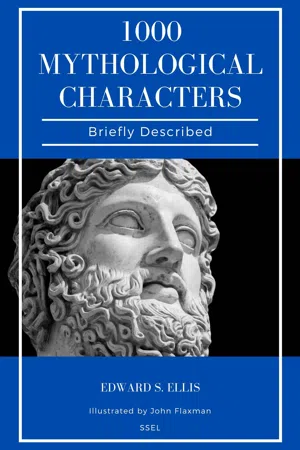Pactolus (Pacto′lus). The river in Lydia where Midas washed himself by order of Bacchus, and the sands were turned to gold.
Paean (Pae′an). A name given Apollo, from paean, the hymn which was sung in his honor after he had killed the serpent Python. Paeans were solemn songs, praying either for the averting of evil and for rescue, or giving thanks for help vouchsafed.
“With hymns divine the joyous banquet ends,
The Paeans lengthened till the sun descends.”
Pope.
Palaemon (Palae′mon), or Melicerta, a sea-god, son of Athamas and Ino.
Pales (Pa′les). The goddess of shepherds and sheepfolds and protectress of flocks; her festivals were called by the Romans Palilia.
“Pomona loves the orchard,
And Liber loves the wine,
And Pales loves the straw-built shed,
Warm with the breath of kine.”
Macaulay.
“Great Pales help, the pastoral rites I sing,
With humble duty mentioning each thing.”
Pope.
Palladium (Palla′dium). A famous statue of the goddess Pallas (Minerva). She is sitting with a spear in her right hand, and in her left a distaff and spindle. Various accounts are given of the origin of the statue. Some writers say that it fell from the skies. It was supposed that the preservation of the statue would be the preservation of Troy; and during the Trojan War the Greeks were greatly encouraged when they became the possessors of it.
Pallas (Pal′las), or Minerva. The name was given to Minerva when she destroyed a famous giant named Pallas. The Greeks called their goddess of wisdom Pallas Athene. See Minerva.
“Apollo, Pallas, Jove, or Mercury,
Inspire me that I may this treason find.”
Shakespeare.
Pan. The Arcadian god of shepherds, huntsmen, and country folk, and chief of the inferior deities, is usually considered to have been the son of Mercury and Penelope. After his birth he was metamorphosed into the mythical form in which we find him depicted, namely, a horned, long-eared man, with the lower half of the body like a goat. He is generally seen playing a pipe made of reeds of various lengths, which he invented himself, and from which he could produce music which charmed even the gods. These are the Pan-pipes, or Syrinx. Pan’s terrific appearance once so frightened the Gauls when they invaded Greece that they ran away though no one pursued them; and the word panic is said to have been derived from this episode. The Fauns, who greatly resembled Pan, were his attendants.
“Piping on their reeds the shepherds go,
Nor fear an ambush, nor suspect a foe.”
Pope.
Pandora (Pando′ra), according to Hesiod, was the first mortal female. Vulcan made her of clay, and gave her life. Venus gave her beauty; and the art of captivating was bestowed upon her by the Graces. She was taught singing by Apollo, and Mercury taught her oratory. Jupiter gave her a box, the famous “Pandora’s Box,” which she was told to give to her husband, Epimetheus, brother of Prometheus. As soon as he opened it there issued from it numberless diseases and evils which were soon spread all over the world, and from that moment they have afflicted the human race. It is said that Hope alone remained in the box. Pandora means “the all-gifted.”
“More lovely than Pandora, whom the gods
Endowed with all their gifts.”
Milton.
Pantheon (Panthe′on) (lit. “the all-divine place”). The temple of all the gods, built by Agrippa at Rome, in the reign of Augustus (B.C. 27). It was 144 feet in diameter, and 144 feet high; and was built in the Corinthian style of architecture, mostly of marble; while its walls were covered with engraved brass and silver. Its magnificence induced Pliny to give it rank among the wonders of the world.
Paphia (Pa′phia), a name of Venus.
Papremis (Pap′remis). The Egyptian Mars.
Parcae, The (Par′cae), were goddesses who presided over the destiny of human beings. They were also called the Fates, and were three in number, Atropos, Clotho, and Lachesis. See Fates.
Paris (Par′is), the son of Priam, king of Troy, and of his mother Hecuba. It had been predicted that he would be the cause of the destruction of Troy, and his father therefore ordered him to be strangled as soon as he was born; but the slave who had been entrusted with this mission took the child to Mount Ida, and left it there. Some shepherds, however, found the infant and took care of him. He lived among them till he had grown to man’s estate, and he then married Oenone, a nymph of Ida. At the famous nuptial feast of Peleus and Thetis, Discordia, who had not been invited, attended secretly; and when all were assembled, she threw among the goddesses a golden apple, on which was inscribed “Let the fairest take it.” This occasioned a great contention, for each thought herself the fairest. Ultimately, the contestants were reduced to three, Juno, Pallas (Minerva), and Venus; but Jove himself could not make these three agree, ...
